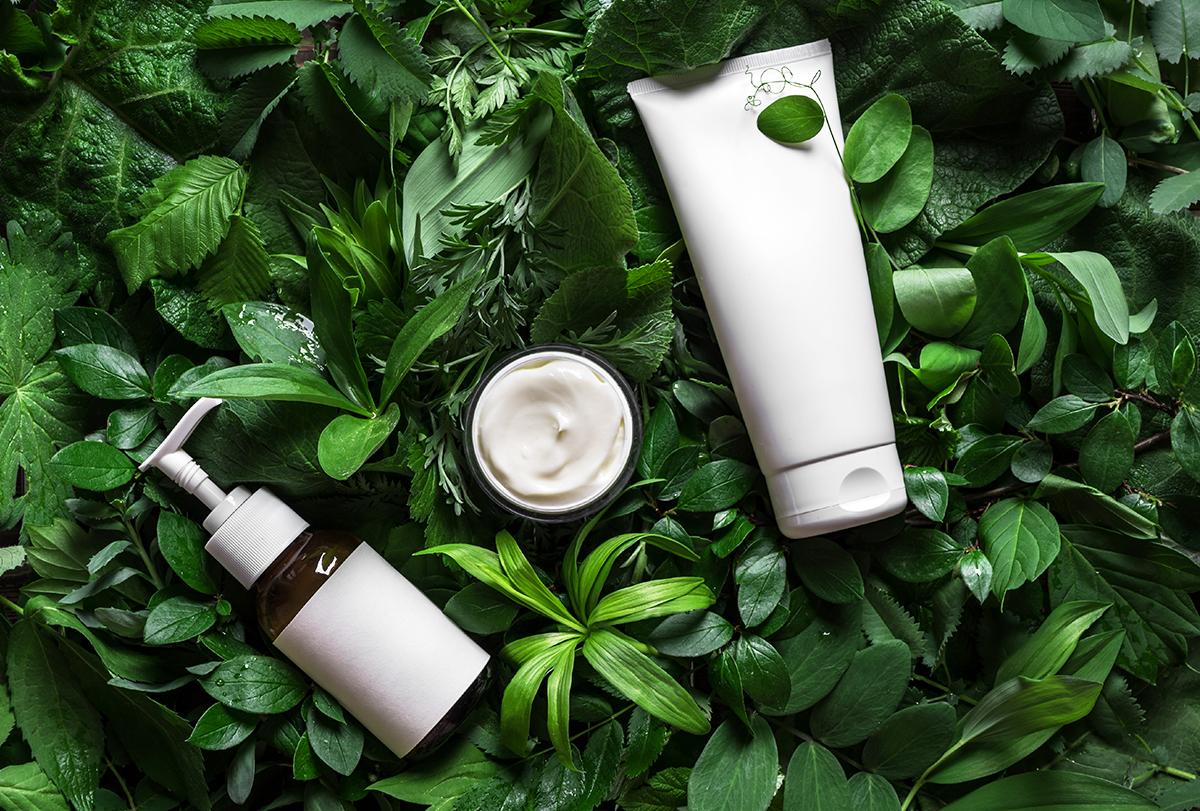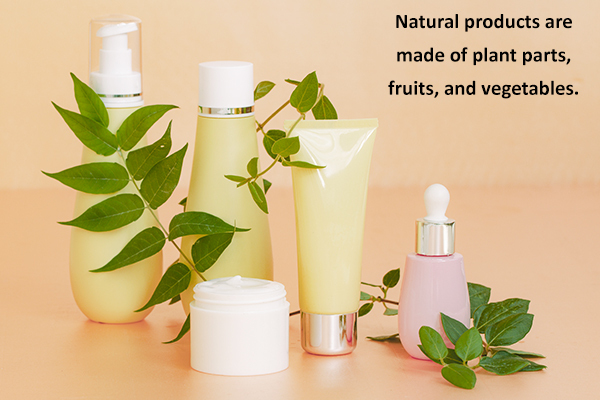In this article:
There are several nature-based, eco-friendly products available on the market nowadays, sold under the label of natural, organic, herbal, or Ayurvedic. These terms are often used interchangeably, but they are not exactly the same.

This article has compiled the various differences between herbal, natural, organic, and Ayurvedic products.
Major Differences Between Herbal, Ayurvedic, Natural, and Organic
| Herbal | Ayurvedic | Natural | Organic |
|---|---|---|---|
| Contains plant extracts, leaves, roots, and flower extracts | Contains plant parts such as roots, leaves, stems, and flowers as well as heavy metals and oils | Contains plants and minerals | Contains naturally sourced ingredients such as plant parts, flowers, leaves, etc. |
| The ingredients may be contaminated with chemical fertilizers, pesticides, and heavy metals, such as lead, mercury, and arsenic | May contain toxic heavy metals | May be contaminated with chemical fertilizers and pesticides | Free from artificial fertilizers, pesticides, etc. |
| Are not regulated by any standards | Global and local standards are maintained in India as Ayurveda is considered a legitimate medicinal science in the country | Certain standards of purity are present but are lax with no regulations | Heavily regulated with several standards of purity both locally and globally |
Note: All of the above may contain synthetic oils and artificial fragrances.
Properties of Herbal, Ayurvedic, Natural, and Organic Products
The most commonly seen labels are:
- Herbal
- Ayurvedic
- Natural
- Organic
1. Herbal products
Herbal products are made from herbs, herb extracts, leaf and flower extracts, (1) etc.
The ingredients used in a herbal product may be grown with the help of chemical fertilizers and pesticides and ingredients may also contain heavy metals, such as lead, mercury, and arsenic.
Herbal products can have strong effects on the body and may treat a number of health issues. They are available in the form of dietary supplements (capsules, powders), topical ointments, and face creams, among others. (2)
Herbal products mostly contain ginkgo biloba, garlic, (3) chamomile, and neem. Herbal supplements and medicines do not come under FDA regulations as they are considered to be a food product rather than a drug. (4)
2. Ayurvedic products
Ayurveda is an ancient science that originated in India thousands of years ago. (5) It is heavily reliant on the use of plants, plant extracts, and minerals for the treatment of several diseases. It is a form of alternative medicine that has proven effective in treating many different types of ailments.
Ayurvedic products may also contain trace amounts of heavy metals such as mercury, silver, copper, gold, sulfur, tin, and the ingredients used might have been grown using chemical fertilizers and pesticides. (6)
They are available in the form of powders, tablets, lotions, etc. Common examples of Ayurvedic ingredients include licorice root and ashwagandha.
Ayurvedic medicines can be very potent, so it is important that they are made with authentic ingredients and techniques, or else they can lead to deleterious side effects.
In India, for instance, only those manufacturers that have the Ayush license issued by the Govt. of India are allowed to produce Ayurvedic products.
3. Natural products

Natural products are made of plant parts, fruits, vegetables, and minerals found in nature. (7)
Often, the ingredients listed on the label may sound synthetic but really it may not be the case. Example – Sodium chloride; in actual it is just another name for sea salt.
Currently, the US Department of Agriculture does not have any regulations for the “natural” label and any product containing even a little bit of a plant extract can be called natural, no matter how many synthetic chemicals are added to it.
Hence, always ensure that the products you buy are actually natural by checking the ingredient list on the label. Plus, best to opt for those natural products that are actually certified by some organisation in that field.
They may or may not contain preservatives and fragrances but the ingredients may be grown with the help of chemical fertilizers and pesticides.
4. Organic products
Organic products contains natural ingredients that are grown without the use of fertilizers or pesticides. (8) They are eco-friendly and safe for use in most cases. (9) They also may or may not contain preservatives and artificial fragrances.
The organic label is heavily regulated and all products are tested before they reach the consumer markets. Organic products include edibles, clothing, and skin care. (10)(11)
When you buy an organic product, make sure to check that it’s actually a certified organic product. Just having “Organic” in the brand name doesn’t make it actually organic, therefore checking the certification is a must.
Which Is Better for Skin and Hair?

Each skin type is unique and different people may have different reactions to the same product.
While all four types of products may be beneficial, do check the ingredients list as it’s the most important thing that will help you to decide what’s right or wrong.
Common Side Effects
Most of these products are made of natural sources and are therefore safe to use. Nevertheless, some people may experience the following side effects:
- Rashes and skin irritation
- Headaches
- Nausea and vomiting
- Diarrhea
- Allergic reactions
Note: Always consult your gynecologist before trying any of these products if you are pregnant or breastfeeding.
If you are using a skin care product for the first time, patch test it on a small area of the skin (underside of the arm or neck) before complete application. This will help rule out any allergies or adverse skin reactions.
Most-Asked Questions
Are natural and organic skin care products the same?
Natural and organic skin care products are not the same.
“Natural” products are made up of ingredients found in nature like plants and minerals. “Organic” products also contain plant-based ingredients but unlike “Natural” they are grown without pesticides and synthetic fertilizers.
However, always ensure that the organic products you buy are certified genuine.
Are organic and herbal skin care products the same?

No. Both organic and herbal skin products are made up of plant parts but they are not the same in two respects.
Firstly, the ingredients used for making organic products are cultivated without the use of harmful pesticides and fertilizers but those used in herbal products may contain these contaminants.
Secondly, organic products have to pass several regulatory standards of purity whereas herbal products do not undergo any such regulation.
Are natural and Ayurvedic skin care products the same?
Again, no. Natural beauty products are made from plants and minerals. They can be used to improve your skin texture and complexion.
Ayurveda, on the other hand, is the traditional system of Indian medicine. It is a form of alternative medicine that can treat a number of diseases and common skin problems.
Final Word
All types of nature-based products are good as long as they do not contain any harmful chemical additives.
Hence it’s always advised to read the ingredients list on the label and ensure that the product you use is chemical-free. Even better if it’s certified by some reputed regulatory body which guarantees its purity.
A particular product does not work the same way on every skin or body type. Therefore, it can yield different results for different people. You should try a few different products to find what suits you best.
- Was this article helpful?
- YES, THANKS!NOT REALLY


